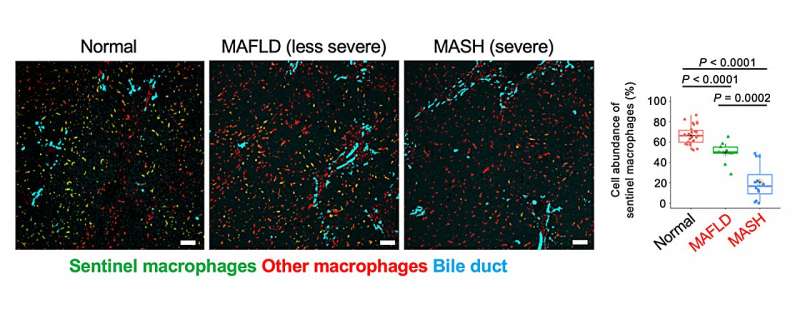Osaka University researchers have discovered liver resident macrophages’ pivotal role in defending against gut bacteria and related substances entering via the portal vein, particularly under compromised intestinal barrier conditions. Identified as “sentinel macrophages,” they are activated by isoallo-lithocholic acid.
This finding holds promise for developing preventive and therapeutic strategies for liver chronic inflammatory diseases, such as metabolic dysfunction-associated steatohepatitis (MASH), by enhancing the function of these macrophages to mitigate inflammation and improve treatment efficacy.
The liver and intestines are directly connected via the portal vein, a blood vessel that transports nutrients absorbed in the intestines directly to the liver. The intestines harbor numerous gut bacteria, and sometimes these bacteria and their related substances can enter the liver through the portal vein.
This is especially problematic when the intestinal barrier is compromised, as seen in conditions like ulcerative colitis or leaky gut syndrome, allowing many gut bacteria and related substances to reach the liver. Under normal circumstances, the liver’s immune system is able to defend against the invading gut bacteria and related substances and prevent inflammation, but the exact mechanism behind this was unclear.
Using innovative technologies like in vivo imaging of the liver and analysis of single-cell gene expression while preserving tissue locational information, a research group led by Yu Miyamoto and Masaru Ishii at the Graduate School of Medicine of Osaka University has revealed that certain resident macrophages near the entrance of the liver protect it against intestinal bacteria and related substances.
Dr. Miyamoto, a lead author of the study published in Nature, explained, “Our technology showed that these ‘sentinel macrophages’ play a crucial role in protecting the liver from inflammation caused by intestinal bacteria and related substances.”

Additionally, the study found that isoallo-lithocholic acid (isoallo-LCA), a secondary bile acid produced by some gut bacteria, trigger the activation of these sentinel macrophages.
With the rise in conditions like leaky gut due to modern lifestyles (stress, high-fat diets, and lack of exercise), there is increasing concern about inflammation affecting various organs, including the liver. Metabolic dysfunction-associated steatohepatitis (MASH), often accompanied by the leaky gut, has been particularly concerning due to its ever increasing incidence and challenging treatment.
This research sheds light on how liver sentinel macrophages defend against gut commensal invaders, offering hope that enhancing their functions could lead to the development of new preventive and therapeutic strategies for liver chronic inflammatory diseases, including MASH.
More information:
Yu Miyamoto et al, Periportal macrophages protect against commensal-driven liver inflammation, Nature (2024). DOI: 10.1038/s41586-024-07372-6
Citation:
Identifying a new liver defender: The role of resident macrophages (2024, April 25)
retrieved 5 May 2024
from https://medicalxpress.com/news/2024-04-liver-defender-role-resident-macrophages.html
This document is subject to copyright. Apart from any fair dealing for the purpose of private study or research, no
part may be reproduced without the written permission. The content is provided for information purposes only.

